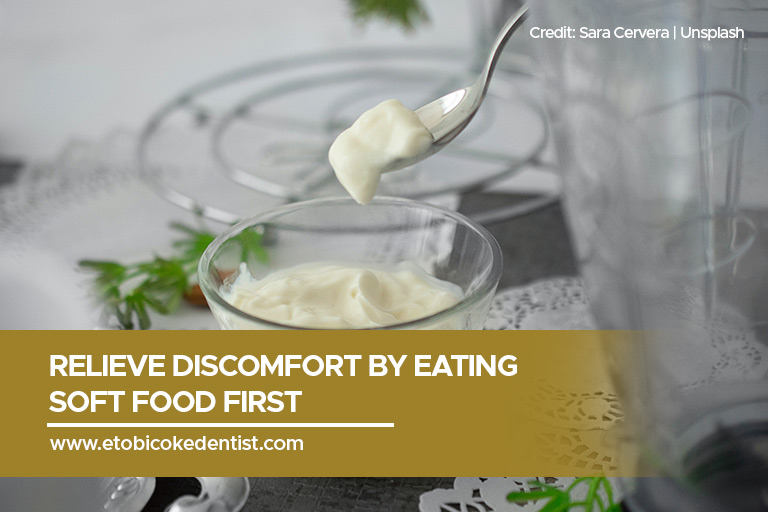It could take some time to adjust to your new dentures. The biggest adjustment for many people who wear dentures comes with what and how they eat. Food is likely to become caught in the areas around the dentures causing discomfort. Additionally, eating hard foods might cause dentures to slip out of position. So, it is just natural to wonder “what foods are off-limits with dentures?”
It is crucial to be cautious with your food choices in your first few weeks with dentures so that your mouth can adjust to a new life with it. Here is some advice on what meals work best with your new dentures.
What You Can Eat

If you’re considering having dentures, keep in mind that you can lessen pain and sensitivity in your teeth by eating the right things and avoiding the rest. Here are some of what you can eat after getting new dentures:
- Slow-cooked meats
Meat often becomes more tender the longer it is cooked. Many slow-cooking techniques can also provide meat-rich, complex flavours. Consider having a pot roast, pulled pork, or beef brisket.
- Ground meats
Because much of the toughness is removed during grinding, ground meats are simple to eat with dentures. There are numerous recipes that include ground meat, including meat pies, tacos, and casseroles. Ground turkey is leaner than ground beef if you don’t like fatty meat.
- Spreads, not containing nuts
Replace peanut butter with hummus if you enjoy it for its combination of sweet and salty flavours or for its high protein content. This spread and dip, which is made from chickpeas, has a moderate flavour that goes well with many other seasonings. Try cream cheese as a sweeter alternative to nut butter.
- Chocolate
Denture wearers who love candy can still indulge their sweet tooth with chocolate. You’re good to go as long as you stay away from candy bars that contain nuts, toffee, or other potential denture hazards. Buy yourself a delicious bar of European chocolate or a few handmade chocolates.
- Ripe fruits
When ripe and ready to eat, many fruits have a natural tendency to become soft. You can eat most fruits with dentures, whether you love oranges, tomatoes, peaches, bananas, or mangos. Make a smoothie by blending fruits with ice cream or frozen yogurt for another great treat.
- Cooked vegetables
In their raw state, vegetables have a tendency to be hard and crunchy, but boiling, steaming, or microwaving them makes them softer. You can never go wrong with vegetables because they come in such a vast range and wide selection.
What You Cannot Eat

You will eventually be able to eat most of the foods you normally like. Just make sure to chew completely and evenly using both sides of your mouth. Even so, there are still some things you can’t eat with dentures. These foods fall under these categories:
- Raw fruits and vegetables
While no one should completely cut out fruits and vegetables from their diet, some of them, like carrots, apples, and corn on the cob, may cause problems for those with dentures. Hard foods exert a lot of pressure on the incisors (front teeth), which might cause the dentures to come loose.
- Popcorn
Popcorn is a well-beloved snack, but eating it with dentures can be troublesome. If a kernel becomes lodged between your dentures, it will feel uncomfortable or may hurt until it is taken out.
- Steak and Chewy Meats
Foods that take many bites to tenderize put unnecessary strain on gums and dentures. The area where dentures and gums meet might even develop sore spots from excessive chewing and grinding, so stay away from meats like steak, ribs, and pork chops for now.
- Staining fluids
When wearing dentures, think about cutting back on your caffeine intake. Dentures are just as susceptible to stains as real teeth. Similar stains can also be produced by black tea and red wine. On fresh dentures, the stains show up more quickly and are more visible. Additionally, caffeine is a diuretic which can induce dry mouth and dehydration. Because saliva acts as a natural lubricant and reduces friction between your dentures and gums, this causes extra issues.
- Sticky candy
Sticky things might cause your dentures to shift out of position, allowing food to seep between them and irritate your gums. Gummy and sticky candies are a couple of examples.
Tips When Eating With Dentures
Eating with dentures for the first time can be hard and stressful. So, here are some tips on how to eat with dentures for first-timers.
- Start slowly
It’s a good idea to stick to a liquid diet for the first few days, which includes things like apple sauce, pudding, oatmeal, soup, and so on. Give your sensitive gums a few days to adjust to the dentures before moving on to solid food to avoid discomfort and possible gum damage.
- Chew evenly
Most people prefer to chew on one side of their mouth more than the other, but this may increase the likelihood of the denture falling out of place. When you resume eating solid foods, chew slowly and evenly on both sides of your mouth. In time, you’ll do this naturally, which will help make the dentures more stable.
- Drink hot liquids carefully
Be careful when drinking hot liquids soon after receiving your dentures. Because of their insulating properties, you might not notice that anything is excessively hot until it’s too late. Take a tiny sip of a hot beverage first to ensure it’s safe to drink.
- Slice your food into more manageable portions.
Cutting your food into smaller pieces will make chewing easier and relieve some of the pressure on your gums while they are still trying to adjust to your new dentures.
- Beware of hard and tough foods
Always make sure that the food you eat has either been stewed or slowly cooked over a period of hours because certain foods, like red meat, can be very difficult to chew when wearing dentures.
- Eat sticky foods cautiously
Sticky foods, such as chocolates, peanut butter, gum, and some berries, can easily get stuck between your dentures and your gums, increasing your risk of pain and infection. Enjoy them, but be sure to thoroughly clean your mouth and dentures afterwards.
- It is normal to feel a little sore
Expect your jaw and gums to feel a little sore during the process since, even if you go slowly, you’re still asking a lot of your body while it adapts to your new dentures. Be sure to get in touch with your dentist straight away so they can adjust your dentures if you develop a particularly painful spot on your gums or when the pain becomes severe.
As your facial muscles adjust to the changes in your bite and the new positions of your tongue, lips, and cheeks, adjusting to life with dentures can take some time. Thankfully, there are steps you may take to lessen these effects as you adjust to your dentures. A big part of making the switch to dentures is being mindful of what and how you eat.
If you are looking for an Etobicoke dentist to help you rebuild your smile to perfection, Dr. Mark Rhody Dentistry is here for you. Contact us today at (416) 231-4281!
